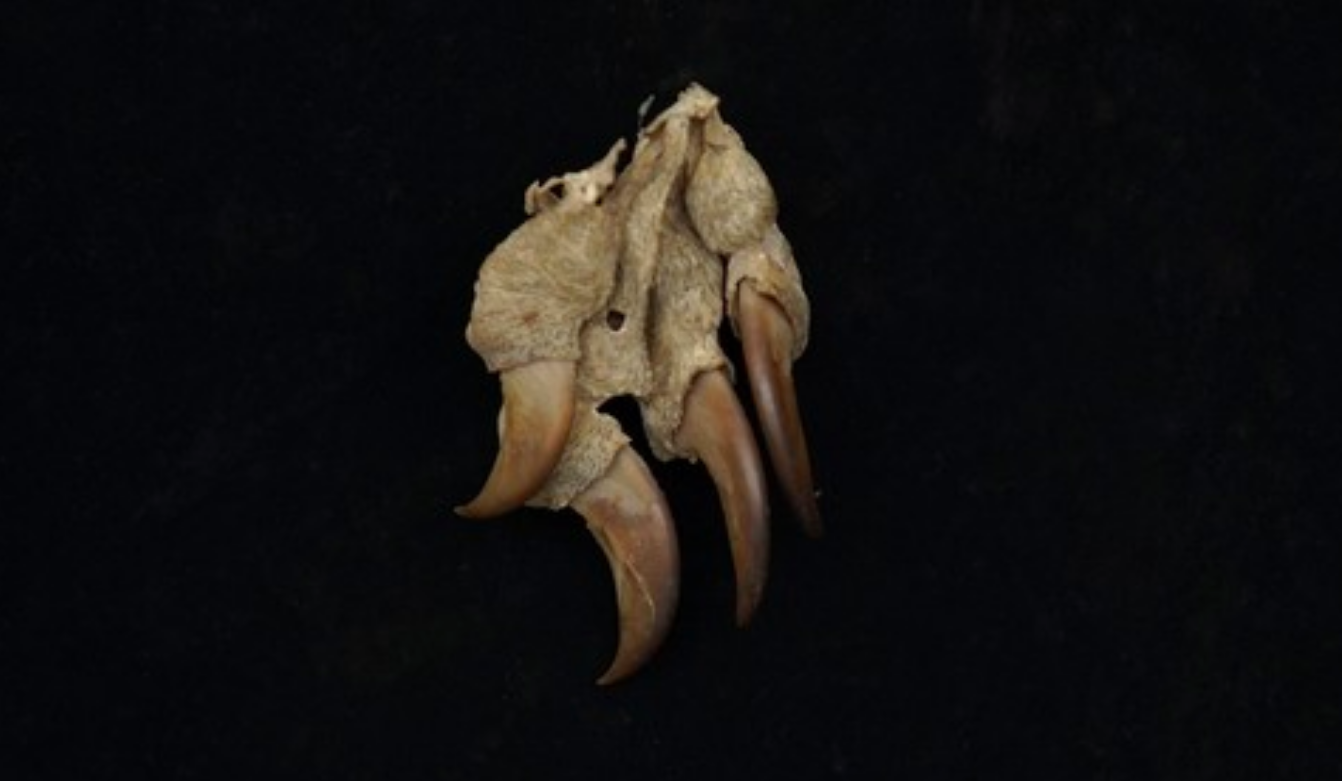
Este es un texto realizado en alianza periodística entre Vice en Español y Mongabay Latam.
Gotas microscópicas se suspenden en el aire, un velo de agua esconde el cañón del río Cartama. La niebla recorre las montañas. Los yarumos aparecen entre el verde encino del bosque espeso. Néstor le acomoda la jáquima a Pacho, el caballo alazán que compró hace catorce años. Levanta la mirada para buscar el sol detrás del cielo gris pero el techo de zinc avisa que habrá lluvia.
-“En cualquier momento se descuelga el agua”, dice Franco.
En una casa escondida detrás de un guadual vive Néstor Franco, un campesino que hasta hace una década cazaba osos, pumas y armadillos con una escopeta Remington de calibre 12. Su esposa Olivia y sus cuatro hijos prefieren la ciudad, aunque el año pasado Mónica, la hija mayor, volvió de Medellín porque con la pandemia se quedó sin trabajo. En ese rancho a 2,600 metros, Néstor Franco vive solo, por estos días con Mónica. Su casa es una de las veintiséis de La Betania, una vereda del Suroeste antioqueño donde la mayoría de las familias cultiva microlotes de café especiales.
El Suroeste es una subregión de Colombia conformada por 23 municipios, entre ellos Támesis, el pueblo al que Franco baja cada fin de semana con dos bultos de arracachas para vender en la plaza. El Suroeste comunica también el centro del país con las selvas del Pacífico sobre una de las ramificaciones de la cordillera de los Andes en Colombia. La cordillera occidental es uno de los cinturones de oro y cobre más importantes del continente y a su vez hace parte del corredor biológico del oso andino. En La Betania, una vereda de Támesis, que fue colonizada por campesinos arrieros, la gente convive hace más de seis décadas con el Tremarctos ornatus, el oso de anteojos, el oso frontino: nuestro oso latinoamericano. Una especie animal y una comunidad campesina que hoy se encuentran amenazadas por la empresa minera Anglo Gold Ashanti.
Imágenes de cámara trampa instalada en el bosque de Támesis que muestra a dos ejemplares de oso de anteojos. Video: Gaia Red de Monitoreo Comunitario.
-“¿Tintico?”, pregunta Sonia.
Le recibo la arepa. Néstor Franco viene detrás con la gorra húmeda. Nos sentamos sobre una butaca de madera que aguanta un bulto de fertilizante.
-“La primera vez que lo vi no creí que era un animalito de esos. Yo iba a caballo para un cultivo de moras que tengo arriba y me di cuenta cuando empezó a mover las orejitas. Pensé ese debe ser uno de los terneros del compadre Alonso, entonces me quedé mirándolo hasta que se paró frente a un plástico donde habían arrumadas unas arracachas, pero cuando de pronto se empezó a alzar en los pies y ahí supe que no era ganado. Tenía el pecho grueso, como del tamaño de un ternero de cuatro meses… Al rato me lo volví a encontrar, pero ya eran dos. Estaba uno detrás del otro frente al rancho del compadre Jaramillo”, narra Franco.
Cerca de la casa de Néstor Franco, las cámaras trampa han grabado cinco osos de anteojos en los últimos seis meses. Su finca hace parte del corredor biológico del oso andino, un segmento de 435 mil hectáreas que no ha sido considerado dentro del Plan de Manejo Ambiental del yacimiento Quebradona, la primera de cinco minas que espera construir la multinacional sudafricana AngloGold Ashanti en el Suroeste antioqueño de Colombia.
-“Uno los reconoce cuando vienen de frente -cuenta Franco- porque por detrás son culi secos. Hace dos meses les encontré un comedero ahí donde tengo las matas de maíz. Bajando por el zanjón había un palmito despedazado, no quedaba sino el bagazo y las raíces porque los osos se comen solo el centro del palmito, lo que está tierno”, cuenta.
Néstor Franco construyó esa casa hace treinta años con Olivia Jaramillo. Subieron a caballo los cien bultos de cemento y los mil adobes –masa de barro– por un camino real que hoy es de rocas grandes, y limpiaron el monte para extender un planchón de 60 metros sobre el que construyeron esa casa con los 750 mil pesos (190 USD) que les prestó el banco.
En La Betania antes había más familias, pero después del 2002 la mayoría se fue para Medellín.
Aunque el Suroeste hoy es una zona relativamente tranquila en comparación con otras regiones de Colombia, la violencia allí comenzó a mitad del siglo veinte cuando los campesinos se rebelaron en contra de los dueños de las grandes haciendas cafetaleras en un país que se dividía entre liberales y conservadores. La última ola de violencia en el Suroeste fue a finales de los años noventa y a principios de los dos mil cuando la hegemonía paramilitar tuvo su mayor apogeo y el cartel de Medellín permeó la subversión. Durante esos años muchos campesinos como Néstor Franco abandonaron sus tierras o se quedaron aguantando la voluntad del grupo de turno.
Néstor y Olivia se fueron de allí a los tres años de haberla terminado. Se fueron para Támesis con sus hijos pequeños donde todos terminaron acostumbrándose a la ciudad. Pero Néstor Franco, así como otros hombres de La Betania, regresó a buscar sus tierras, pero ya sin mujeres y sin hijos. Desde entonces muchas casas siguen solas.
En su finca de 54 hectáreas tiene cuatro vacas, un cultivo de maíz, uno de moras, unas plantas de café, y el tajo de arracachas que por estos días está botando la última parte de la cosecha; un estilo de vida que convive con varias especies en vía de extinción como lo es el oso andino y que hoy está amenazado por un proyecto que ansía convertir esa región en un distrito minero.
–Móntese en Pacho y más adelante nos cambiamos.
La casa del oso
Atravesamos una cañada y subimos hacia el arracachal. En los troncos de algunos robles se ven talladas las garras de los osos que se suben hasta los cardos para comerse el centro de las bromelias como si fueran alcachofas.
La Corporación Gaia, una ONG regional, trabaja desde 2011 por la protección de esta especie a través de su programa Abrazando Montañas. Héctor Restrepo, su fundador, ha buscado frenar los efectos de la ganadería, la caficultura, los cultivos de pino, de gulupa, de aguacates y otros sembríos que fragmentan el bosque altoandino.
“La mayoría de estos proyectos agrícolas -según Restrepo- ya sean grandes o pequeños, desconocen las necesidades de desplazamiento, movilidad y recursos que necesitan especies como el oso andino para su alimentación, refugio, reproducción y cría”.
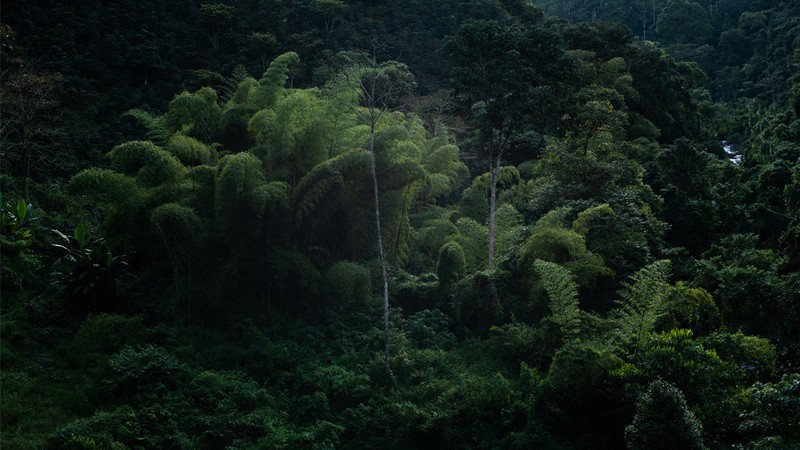
Según explican biólogos y expertos que como Restrepo llevan años estudiando la especie, un corredor es un área con vegetación natural que facilita y permite el desplazamiento del flujo de la vida silvestre para que distintos individuos se puedan encontrar, reproducir, buscar comida y refugio. En el caso del oso, la deforestación ha limitado el encuentro entre individuos y, por tanto, ha impedido el mantenimiento de poblaciones saludables y permanente contacto entre sus miembros. Dicho contacto es fundamental para mantener la variabilidad genética de la especie, y en este caso de sus poblaciones, por ende, su capacidad de responder a cambios. El oso andino es el único oso que hay en cinco países de Suramérica y el único oso grande que existe en Colombia, pero hoy solo hay pequeñas poblaciones en el país, explica Restrepo, porque la cacería y la tala de bosques han contribuido a la pérdida del hábitat.
“El oso andino es el único oso que hay en cinco países de Suramérica y el único oso grande que existe en Colombia, pero hoy solo hay pequeñas poblaciones en el país, explica Restrepo, porque la cacería y la tala de bosques han contribuido a la pérdida del hábitat”.
“Parte de la función que cumplen los árboles, además de suministrar alimento a los animales -agrega Restrepo-, es que les permite ocultarse. Normalmente donde tenemos bosque siempre hay agua y donde hay agua en esta región hay osos, entonces ahí coinciden los tres: bosque, agua y osos. Además, los osos son unos sembradores de bosque, unos jardineritos. Ellos se suben a los árboles, se comen las pepas que encuentran, tumban los cardos y las ramas que permiten que la luz llegue hasta el piso y así se puedan germinar las semillas que hay regadas en el suelo”.
En 1993 se implementó en Colombia la ley 99 y con ella aparecieron las autoridades ambientales y las Corporaciones Autónomas Regionales que regularon la cacería. La Betania, Urrao, Frontino, Abriaquí eran pueblos de cazadores. La venta de huesos era un negocio y la carne de oso un plato popular entre los antioqueños. De Medellín llegaban turistas buscando las garras y las pieles, pero a raíz del trabajo de la Autoridad Ambiental, y por miedo a la sanción que en Colombia es carcelaria, la mayoría fue dejando las escopetas y descubriendo en el camino el valor de la conservación de ese ecosistema. Hoy esos campesinos que antes eran cazadores no solo quieren proteger al oso sino también al puma concolor; al rupicola peruvianus más conocido como el gallito de roca, un ave insignia de la región, al armadillo desypodidae y a otras especies que se han convertido en símbolos para la gente.
“¿Usted sabía que la minera no tuvo en cuenta al oso? -me preguntó Hector Restrepo cuando lo conocí-. Lo único que hizo fue hacer un listado de las especies que hay aquí sin entender cómo se relacionan ni cuántas hay de cada una. El oso no aparece allí porque seguramente no lo vieron, pero cómo lo van a ver si ellos no conocen el territorio, nunca pusieron una cámara trampa, ni entrevistaron a las personas que viven aquí. Es complicado hablar de lo que no conocen”.
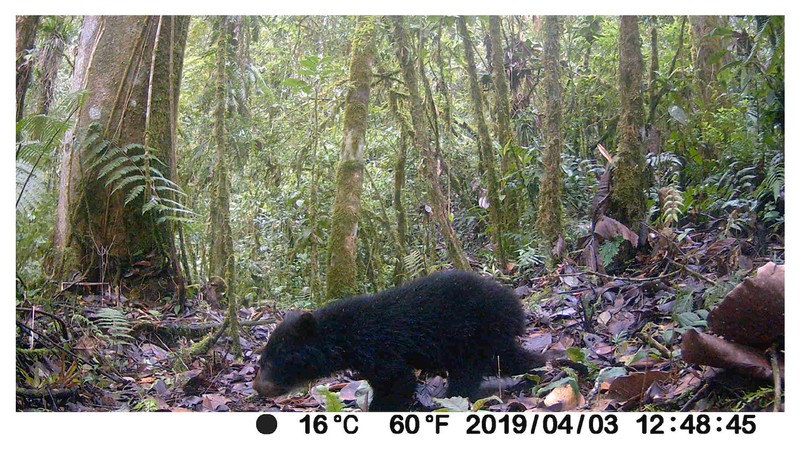
Hace doce años, La Betania hace parte del Distrito de Manejo Integrado la Cuchilla Jardín-Támesis, una zona de reserva forestal de 28,061 hectáreas que fue constituida por la Corporación de Antioquia. Pero, hace aproximadamente el mismo tiempo, la minera sudafricana AngloGold Ashanti empezó a sobrevolar el Suroeste antioqueño para identificar las zonas de mayor concentración de cobre y oro para su proyecto minero Quebradona. A finales del 2020 se habló de esto en los medios de comunicación por el trabajo de los movimientos de resistencia campesina y la campaña “Salvemos al Suroeste” que reunió las voces de políticos, activistas y actores locales que se oponen al proyecto. Aun así, nadie habló sobre las afectaciones del proyecto minero al oso andino pues el Plan de Manejo Ambiental de Quebradona tampoco lo incluyó dentro de su inventario de poblaciones animales.
Quebradona se denomina el proyecto completo de AngloGold Ashanti en el Suroeste antioqueño. De este, el primer yacimiento que pretenden explotar es el Nuevo Chaquiro que está ubicado en el alto del Chaquiro a más de 2.100 metros de altura. Los túneles de esta mina estarían ubicados debajo de la montaña de La Mama, que es una estrella hídrica, es decir, una zona donde nacen las aguas, y del yacimiento La Aurora. Hacia el límite con la zona de protección del oso andino están los yacimientos La Isabella (cerca del alto de la selva) y El Tenedor, que es donde nace Quebradona. La conectividad del ecosistema del Distrito de Manejo Integrado la Cuchilla Jardín-Támesis dependen hoy del Chaquiro y de La Mama, montañas que albergarían, según los planes de la empresa, 5 yacimientos mineros.
“La distancia que hay desde la zona que tiene delimitada la mina como su área de intervención, hasta el punto donde tenemos registro del oso, es menos de un kilómetro. ¿Usted se imagina el ruido que hace una explosión de un taco de dinamita en la roca? Así sea por debajo del suelo, la tierra va a retumbar y los animales que tienen mejor percepción se van a pillar todo eso y creo que todo el mundo se va tener que ir de aquí”, explica Héctor Restrepo. El especialista de la Corporación Gaia añade que si en este momento ya existen problemas por la fragmentación del corredor, “más adelante vamos a tener más y no va a ser solamente para el oso, sino que va a ser toda la fauna que va a huir ante semejante despelote que se va a armar”.
En septiembre del 2020, la Autoridad Nacional de Licencias Ambientales (ANLA) visitó el Suroeste para verificar el Plan de Manejo Ambiental presentado por AngloGold Ashanti y se encontró con un movimiento de resistencia civil conformado por campesinos como Néstor Franco. La ANLA, que es la institución encargada de decidir si le da o no la licencia a la minera para un proyecto que espera operar en la zona por los próximos 38 años, le hizo en ese momento alrededor de 500 requerimientos que ya fueron respondidos por la empresa. Hoy, la empresa está a la espera de que la ANLA siga evaluando su proyecto. Ellos son quienes tienen la decisión final.
Esta no es la primera vez que AngloGold Ashanti tiene que vencer obstáculos para poder poner en marcha sus operaciones.
En 2017 el proyecto La Colosa, que pretendía ser la mina de oro más grande América Latina, fue detenida por la comunidad a través del mecanismo de consulta popular que se llevó a cabo en Piedra, Tolima, pero que el actual gobierno ha dejado sin validez. Gracias a este proceso civil se logró frenar un proyecto que era bastante contrario a las normas ambientales y asuntos laborales de Colombia.
Según la revista SEMANA, en 2010 AngloGold Ashanti fue nominada como la peor empresa para el medio ambiente en el concurso Public Eye, organizado anualmente por la ONG Greenpeace. En febrero de 2010 le cerraron dos minas en Ghana porque afectaba los ríos que proveían de agua a las comunidades, además de crecientes señalamientos de violación de los derechos humanos que incluyen denuncias sobre torturas y asesinatos por personal de seguridad privado de la compañía. AngloGold Ashanti también ha sido obligada a pagar indemnizaciones por graves afectaciones a la salud de sus trabajadores en varios países de África.
Esta empresa minera que ha acumulado en los últimos años varios cuestionamientos a nivel mundial, está ahora en la mira de quienes temen que pueda traer los mismos problemas a un ecosistema irremplazable de Colombia.
En un video de trece minutos en su página de Internet AngloGold menciona que la zona de depósito de la mina Quebradona estaría ubicada a 707 metros del Distrito de Manejo Integrado Cuchilla Jardín-Támesis y a 320 metros del límite municipal de Támesis, sin embargo este municipio no ha sido considerado dentro de la zona de afectación de la mina. Como sostienen los campesinos de la región, “el mapa no es el territorio”, y las afectaciones al agua se verán reflejadas en todo el Suroeste.
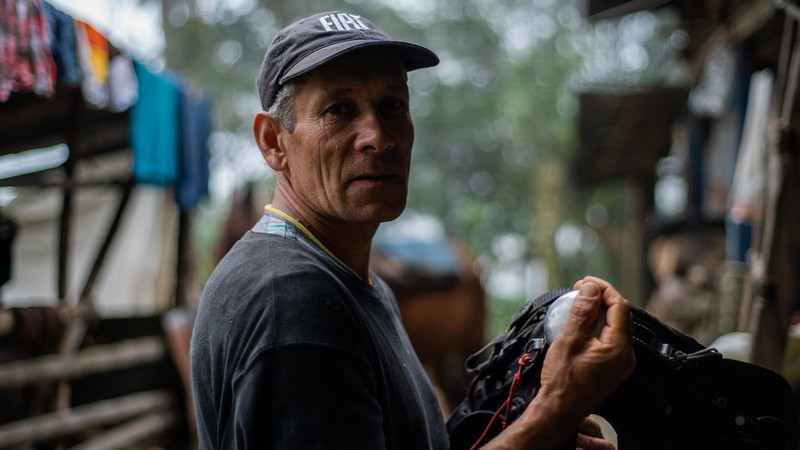
Cualquier división política resulta ineficiente cuando se habla del flujo de poblaciones animales, pues la naturaleza no reconoce límites administrativos. La afirmación de que la zona de afectación de la mina queda a 707 metros de distancia de la zona de reserva y que por tanto no afectará el corredor biológico del oso andino se contrapone al comportamiento de un animal que tiene un ámbito de hogar de 140 km2 con un área de núcleo de al menos 13 km2. El oso andino es una especie sombrilla fundamental para el mantenimiento del bosque andino y hoy muchas de sus poblaciones se encuentran aisladas.
Como bien lo explica Mauricio Vela-Vargas, líder de mamíferos grandes de Wildlife Conservation Society, “el oso andino es considerada una especie omnívora (que consume muchos ítems alimentarios), pero que tiene preferencia por el consumo de plantas. Dentro de su dieta están registradas más de 300 especies de plantas entre las que prefiere las bromelias, palmas de alta montaña y algunas frutas carnosas que se encuentran en bosques andinos y altoandinos. Al consumir un alto porcentaje de plantas, estas, al realizar su paso por el tracto digestivo del oso, las semillas se activan con los ácidos intestinales del oso y al defecar el oso andino dispersa las semillas de un lugar al otro. Al ser una especie con alta movilidad, el movimiento de estas semillas de un lugar a otro estimula el crecimiento de los bosques y aumenta la variabilidad genética de las poblaciones de plantas que consume.”
“El mapa no es el territorio”
Aunque no se ha probado, algunos investigadores opinan también que al ser un carnívoro facultativo (consumir presas vivas y carroña), el oso prefiere la carroña o los animales muertos en los bosques, y esto puede ayudar a los procesos de descomposición de biomasa y flujos de energía dentro de los bosques andinos, altoandinos y páramos al igual que lo hacen los cóndores y buitres.
En entrevista con Edwin Arango, gerente ambiental de Anglo Gold Ashanti, el 9 de junio de 2021, sostuvo que la presencia del oso no fue registrada en el área de intervención de Quebradona que comprende 610,68 hectáreas, pese a que la cercanía a los bosques donde habita esta especie es evidente.
Según José Fernando González, director Científico de ProCAT, Colombia, “el oso andino es una especie elusiva (muy difícil de ver o registrar en periodos cortos de muestreo); por eso, aunque no haya sido registrado dentro de las especies de fauna silvestre dentro del estudio de impacto ambiental de la empresa minera, es casi seguro que esté presente en el área de influencia del proyecto minero”.
Al generarse procesos de deforestación, los osos se ven relegados a pequeños remanentes de bosque, donde potencialmente los recursos para su mantenimiento se vuelven escasos. En palabras de González, “las hembras de oso andino pueden hacer diapausa embrionaria, esto significa que pueden mantener el esperma masculino antes que los óvulos sean fecundados, por lo que si las hembras no poseen suficientes recursos para el desarrollo de los embriones o el mantenimiento de las crías, estas pueden determinar no quedar embarazadas; esto puede afectar de manera importante las dinámicas poblacionales de la especie, teniendo en cuenta que los osos se reproducen aproximadamente cada 2 años en vida silvestre. Por otro lado, al no poder moverse en el paisaje, las hembras se reproducen con los mismos machos de los mismos territorios, lo que puede llevar a procesos de endogamia (reproducción entre parientes cercanos), generando a futuro problemas de degeneración genética de la especie”.
Según AngloGold Ashanti, el corredor oficial del oso está significativamente alejado de su zona de impacto, pero los campesinos y las cámaras trampa de ONG locales lo han visto y registrado en la parte del Distrito de Manejo Integrado que se afectaría con el proyecto, ya sea por la pérdida de bosque vecino como por el colapso del ciclo de aguas que impactaría severamente la biodiversidad y la conectividad.
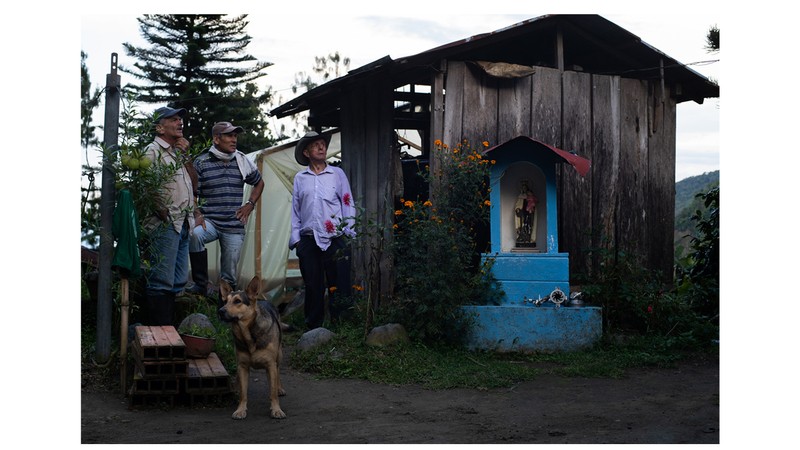
La mina
Néstor Franco es el presidente de la Junta de Acción Comunal de La Betania. Estudió hasta segundo de primaria, pero le pudo pagar la carrera de Ciencias Sociales en la Universidad de Antioquia a Sonia, su hija menor. Néstor construyó los cuatro puentes de guadua y acero que comunican las casas de La Betania porque sueña con que ese lugar se convierta en un sitio turístico para el avistamiento de aves.
–Nosotros que vivimos aquí, llevamos años cuidando estas montañas. Protegiendo este territorio donde no solo vive el oso sino también un montón de aves. Para nosotros es normal verlo pasar por aquí porque ya prácticamente convivimos con él, se podría decir que hasta hace parte del pueblo, por eso lo cuidamos como cuidaríamos a cualquier vecino, dice Néstor Franco mientras guía a Pacho con el cabestro.
El sonido de un radio interrumpe el silencio natural. A unos 500 metros aparece alguien vestido de verde. La niebla le cubre la cara a Darío Jaramillo que alza los brazos desde la punta de la loma. Néstor Franco lo reconoce de lejos y lo saluda. Darío nació en La Betania hace 72 años.
–Yo pensé que ya no venían, dice Jaramillo.
–Nos cogió un poquito la tarde, le responde Franco.
–Vea cómo salieron de buenos los repollos, dice Darío mientras desenfunda el machete y le corta la flor a una col.
Él sube y baja las montañas con la facilidad que le da la costumbre.
–¿Usted se imagina la gente que va a llegar a trabajar a estos pueblos sanos que tenemos? Con la minería llega el dinero y la maldad. El trago y la prostitución, le dice Jaramillo mientras apila las coles sobre un costal.
–Nos quieren vender el cuento de que van a perforar la tierra en un punto y eso no va a afectar a nadie más, pero es como si a uno le quitaran un riñón y nos hicieran creer que no se afecta todo el cuerpo, responde Franco.
En La Betania hay más de 30 nacimientos de agua y 9 cuencas principales.
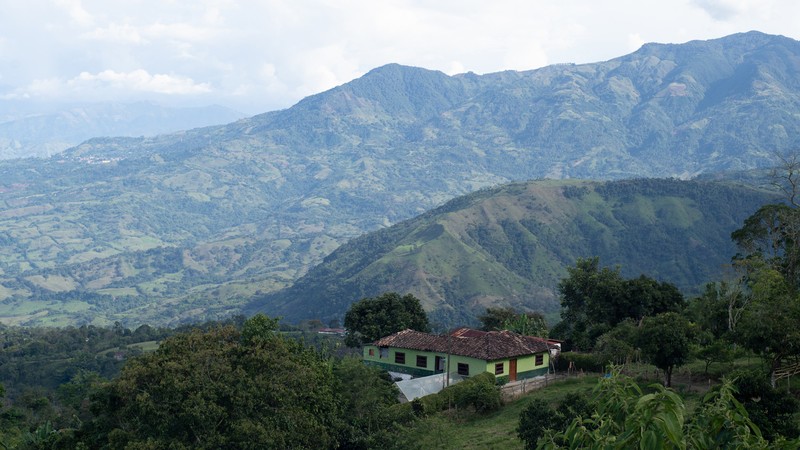
–Aquí vino una señora de la minera a decirnos que ellos empacan la tierra y luego la vuelven a poner en su sitio cuando terminen el trabajo, pero yo le pregunté si las aguas del río Cartama iban a quedar del mismo color y ella se quedó callada, dice Franco.
Por su trabajo como defensor ambiental, Néstor Franco ha recibido varias amenazas. La última fue hace tres años después de cantar unas trovas con mensajes en contra de la minera en una actividad que organizó el profesor de la escuela. A los pocos días recibió una llamada de número desconocido, recuerda que ese día una voz del otro lado del teléfono le dijo: “Fíjese de qué habla”. Algunos días después, narra Franco, cuando volvía del pueblo con dirección a La Betania, le dispararon dos veces pero por suerte no llegaron a lastimarlo.
En Colombia, en 2020, hubo 310 líderes sociales asesinados según datos del Instituto de Estudios para el Desarrollo y la Paz. Hoy, a raíz de las protestas que empezaron en 28 abril de 2021, la lista sigue creciendo.
En el Suroeste mucha gente está lista para pelear porque existen ejemplos cercanos de proyectos mineros como Marmato, al que hoy muchos llaman el queso gruyere porque cada casa tiene un socavón. Aunque el tipo de minería que propone Quebradona es distinto al que hicieron en Marmato, la sombra de la megaminería no deja de atemorizar a las comunidades del Suroeste.
AngloGold Ashanti se autodenomina minería con propósito, pues esperan invertir 42 millones de dólares en desarrollo social a cambio de los 11 billones de dólares que van a recibir en ganancias, lo que equivale al 0,35 por ciento de sus ganancias totales.
–¿Qué se gana un país dando licencias para después tener que sacar plata del bolsillo para un pueblo sin agua? ¿Para un anillito o unos aritos [aretes]? Lo mejor es dejar ese oro quieto. Dejarlo en la montaña que ahí le está prestando un servicio al planeta. ¿Uno para qué quiere un viaje de oro si se va a quedar sin oxígeno o sin agua? ¿Sacarlo para llevárselo a un banco? El oro no se come, el oro no crece. Las autoridades ambientales llegan a decirnos que hay que proteger al puma y al oso, pero por otro lado le están dando licencias a las mineras, dice Darío Jaramillo.
“¿Uno para qué quiere un viaje de oro si se va a quedar sin oxígeno o sin agua? ¿Sacarlo para llevárselo a un banco? El oro no se come, el oro no crece”.
De todas las personas entrevistadas en Támesis para este reportaje, ninguna quiere que se construya Quebradona. La mayoría teme que se pierdan las aguas porque sin ellas no solo se perderían los cultivos sino la biodiversidad que existe en ese lugar.
Si llegara la minería, se preguntan: ¿Qué pasaría con los microlotes de cafés especiales? ¿Qué pasaría con la tranquilidad de esa zona que logró sobreponerse a las secuelas de los grupos armados? ¿Qué pasaría con el sueño de promover ese lugar para el turismo de naturaleza?
El pueblo resiste
–¿Por qué será que no estamos incluidos en el estudio de impacto ambiental de AngloGold Ashanti?, se pregunta con sarcasmo Gonzalo Pérez, secretario de Acuatamesis, una asociación que protege los acueductos comunitarios de Támesis.
Dentro del Plan de Manejo Ambiental que presentó AngloGold Ashanti a la Autoridad Nacional de Licencia Ambientales, Támesis no aparece como zona de influencia. En la entrevista a Edwin Arango, representante de AngloGold, sostuvo que el área de influencia no está delimitada desde el punto de vista político sino desde el punto de vista técnico. En palabras suyas, “el hecho de tener cercanía no quiere decir que sea un área de influencia. Se aplica una metodología establecida por el Ministerio de Ambiente y con base en eso se elabora un estudio de impacto ambiental”.
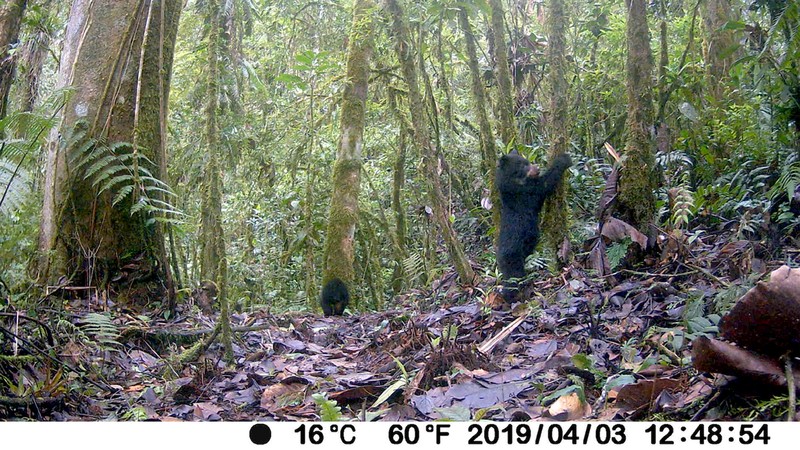
Según ellos, el impacto negativo de un proyecto se mide cuando se afecta la infraestructura social entendida como acueducto, alcantarillado, servicios públicos, energía y agua. Sin embargo, el proyecto estaría ubicado a un lado de la carretera que comunica a Palermo con Puente Iglesias, es decir que uno de esos servicios sí se vería afectado, sin contar las afectaciones a los acueductos de Palermo, Palocabildo, entre otros. Por otro lado, Fredonia, un municipio situado a 35 kilómetros de la zona de influencia, sí está considerado dentro del Plan de Manejo Ambiental de AngloGold. ¿Qué criterios técnicos han tomado entonces en cuenta para incluir a Fredonia y no a Támesis? Finalmente, resulta contradictorio que la ANLA haya elegido a este último como una de las sedes de la audiencia pública que está a la espera desde el pasado julio, como parte del proceso de licenciamiento, considerando que no está dentro del área de influencia del proyecto.
En septiembre de 2020, Juan Martín Vásquez Hincapié, alcalde de Támesis, dijo en una entrevista a Caracol Radio: “El balance de la visita de la ANLA al municipio de Támesis es altamente productivo porque era mostrar la otra región en donde el impacto ambiental del proyecto va ser incluso más severo que al lado de Jericó… porque en este lado, además de ser los más afectados, también somos la sociedad que no quiere de una manera decisiva que se desarrolle este proyecto”.
–Lo que pasa es que aquí en Támesis vive la comunidad indígena embera chami y a la minera no le conviene sentarse a negociar con los indígenas porque todos sabemos que serían los principales opositores. Les conviene más dejarnos por fuera, precisa.
La consulta previa es un mecanismo que implica que cualquier toma de decisiones que afecte directamente a una comunidad indígena reconocida por el Ministerio del Interior de Colombia debe pasar por un proceso de concertación. Esto según la Constitución Política de 1991.
–Nos venden el cuento de que la mina solo va a afectar a Jericó (municipio del Suroeste antioqueño) , pero solo la primera de las cinco minas que quieren hacer tendrá 64 kilómetros de túneles. El modelo que propone AngloGold Ashanti es un modelo de minería subterránea que no ha sido probado en Colombia, y menos en un lugar donde la tierra tiene un nivel freático tan alto y las reacciones del suelo pueden llegar a ser impredecibles. En el peor de los casos podría hundirse la montaña, y si se hunde la montaña se hunden los nacimientos y si se hunden los nacimientos se pierden las aguas y con ello se reconfigura el flujo de las aguas, explica Gonzalo Pérez de Acuatamesis.
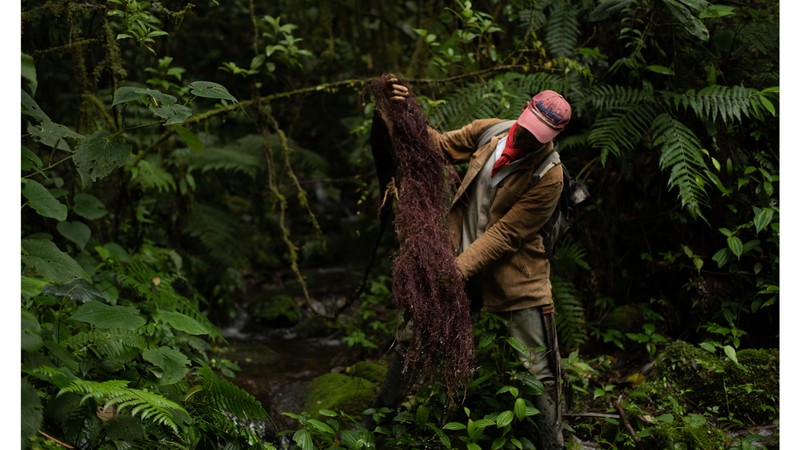
Hacia el norte y occidente de Támesis, AngloGold Ashanti quiere desarrollar un distrito minero de cinco yacimientos que afectarían directamente uno de los afluentes principales del Río Frío, la cuenca más grande del suroeste antioqueño. En la entrevista, la minera sostuvo que solo tiene intereses en el yacimiento Nuevo Chaquiro, pero en el informe de accionistas de 2019 aparecen también el yacimiento La Isabella, La Aurora, El Tenedor y La Sola.
–Se quieren lavar las manos diciendo que a Támesis no lo van a afectar porque no les conviene negociar con los indígenas, pero la realidad es que el resguardo indígena Miguel Certiga Tascón está a menos de 3 kilómetros de la zona delimitada por la mina. Gonzalo.
El exministro de Medio Ambiente, Manuel Rodríguez Becerra, ha dicho que “la mina Quebradona sería el principio del fin de uno de los paisajes más hermosos de Colombia, así como el principio de un grave declive de la vocación agrícola de la región, de sus valores ambientales, de sus tradiciones culturales y de su enorme potencial turístico, con lo que se arruinaría una fuente de creación de empleo y riqueza de largo plazo. Y esta última no es una especulación”. Por su parte, el exministro de Minas y Energía Jorge Eduardo Cock lleva advirtiendo sobre los peligros de Quebradona hace un par de años. En una de sus columnas de opinión para el periódico El Tiempo, en diciembre de 2019, dijo: “Es muy difícil entender por qué en Colombia no evaluamos bien a quién le entregamos una concesión, algo tan delicado como un título minero. Ya lo verán, como ya lo han visto y sufrido muchos países en épocas recientes”.
Al final de mi recorrido por Támesis pude conocer el resguardo La Mirla donde Cristian Zapata, un indígena embera chamí, me dijo que contaminar el agua era como contaminar la sangre de la tierra. Para las culturas indígenas los minerales se asemejan a los huesos de la tierra, son la base de la naturaleza. “Sacarle el oro a la tierra es como si nos sacaran una costilla del cuerpo o nos rompieran los pies, ya no vamos a quedar igual”, me dijo Cristian.
- View this story on Mongabay







